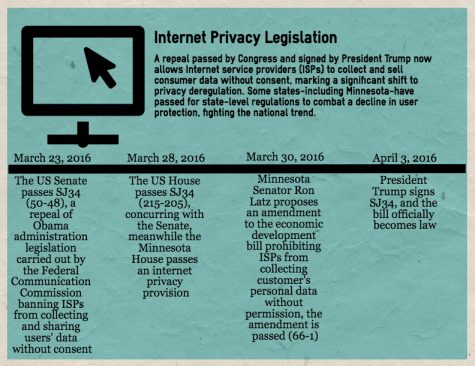MN legislature takes right step towards internet privacy
May 7, 2017

On April 2 President Trump signed a decision by Congress overturning privacy protections approved late in the Obama administration, repealing measures on consumer control of their data. However, on March 29, the topic took a different turn in the Minnesota Legislature when Senator Ron Latz proposed a data privacy amendment that moved to protect online information. The Senate later voted 66-1 to add these protections, with the House approving internet data protections earlier in the week. The state-level shift against deregulation provides the security of information that is increasingly slipping.
The repeal passed by Congress and approved by Trump allows ISPs (Internet service providers) to track users’ actions online and share the data without user consent, which has previously been more regulated. By contrast, the amendment in Minnesota forces ISPs to receive explicit user permission to collect data, and essentially replaces former regulations. The argument about this type of legislation normally includes digital advertiser and data collectors like Google and Facebook, who would not be deterred by this legislation.
Those like Senator Latz argue that this legislation allows choice, while opponents argue that it favors some companies unfairly while not restricting others.
Many supporters of the Congressional bill point out that restrictions on ISPs give other internet companies unfair advantages due to different regulations. The issue with this argument is that instead of trying to protect users across all platforms, politicians take the opportunity to limit privacy. This helps businesses make money selling information to advertisers, turning a profit off of data. In place of repealing protections that create uneven regulations, there should be an increasing trend to defend privacy beyond just ISPs. Due to advocates, an increasing amount of user information is encrypted, which makes it more difficult for third parties to access data.
Protecting data on the internet is not easy, but increasing awareness and passing restrictive legislation helps users make their own choices. The Facebook and Google argument holds some weight, but the reality is that choices in ISP are limited depending on location unlike sites. A provider might not be available in certain areas, leaving fewer choices for consumers, whereas users can choose between browsers and social media networks to find the best way to protect their security. This means that avoiding data collection via sites can be easier to avoid than ISP tracking, making regulation for ISPs more important.
Legislation combating deregulation is increasingly appearing at the state level, and for good reason. Although individuals can take steps to protect their information, it’s important for legal regulation to demand respect for consumer privacy. In a time where more and more personal information can be accessed on the web, protections are more important than ever.